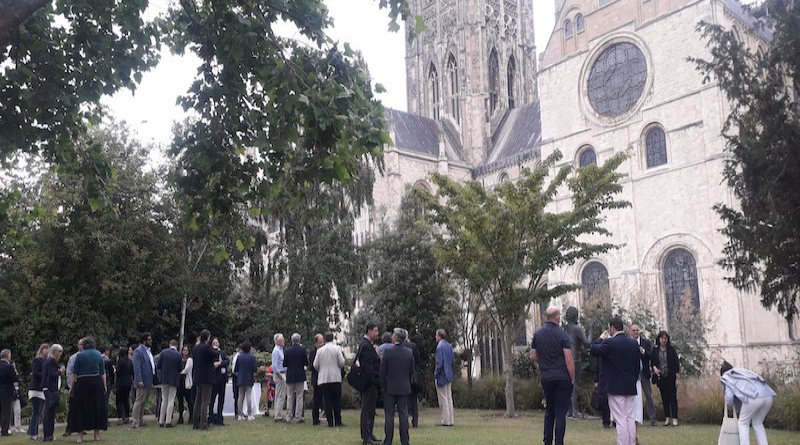Fletcher Students Present at Transatlantic Studies Association Conference
By Daniel Kroth, MALD 2023 Candiate, The Fletcher School
Fletcher School students Alec Dionne, Maggie Fischer, and Daniel Kroth joined University of Michigan Ph.D. student Laura Stahl to speak at the Transatlantic Studies Association Conference at the University of Kent in Canterbury in July 2022. The four were invited to present their panel “War on the Web: The Digital Battle for Narrative Control in the Transatlantic Community,” at the conference for an audience of established faculty and young scholars.
The panel centered the unique dynamics of the transatlantic community in a discussion of narrative control efforts amidst the escalating conflict in Ukraine. It was hosted by Alec Dionne, MALD ’23, whose experience in defense communications and political analysis informed the panel’s overall direction.
Daniel Kroth, MALD ’23, opened the panel with “Innovation, Motivation, and Information: Digital Narrative Management in the Russo-Ukrainian War,” an analysis of the strategic and political factors underpinning Russia’s conflict narrative strategy. The paper drew on historical case studies and social media metadata analysis to argue that Russia’s level of investment in narrative control efforts correlates more closely with these strategic factors than with advances in information technologies or broader adoption of social media.
Maggie Fischer, MALD ’23, presented “Digital Ethics and Human Rights in the Russo-Ukrainian War,” in which she investigated the impact and use of internet connectivity in the conflict zone. She described the use of smartphones to document human rights abuses for future legal proceedings, to gather and distribute material to shape conflict narratives in service to the war effort, and to document lived experiences as a method of developing individual and community resilience.
Laura Stahl, a doctoral pre-candidate in Germanic Languages and Literatures at the University of Michigan, then presented “The Battle for Public Opinion: Russo-Ukrainian Digital Narratives on German Reddit.” In this piece, she tracked German netizens’ reactions to changes in German foreign policy as a case study of narrative generation and consensus building in internet communities.
The presentations were followed by an opportunity for peer feedback and moderated questions from conference attendees. Most questions related to digital methods and the nature of the social media platforms investigated. This led to a productive discussion of the value of cross-pollinating historical research methods with data science methods to harvest and analyze text content in digital spaces.
The Transatlantic Studies Association also provided a variety of professional development opportunities at the conference. These included several roundtables, keynote speeches by Jussi Hanhimäki, Sarah Meer, and Mark Webber, and a young scholars workshop, which brought publishers and experienced academics together with pre-tenure academics to discuss publication strategies.
Attendance at the conference provided an invaluable experience to engage with established scholars and to receive feedback on research and delivery. It also served to deepen professional connections and expose the students attending to the state of the field. Much of the work presented at the conference contributed to the further development of the Ukraine Digital Verification Lab, a project using emerging digital methods to investigate human rights abuses in conflict zones. The student’s attendance was made possible by the Fletcher Russia & Eurasia Program, the Fletcher International Security Studies Program, the Leir Institute, the Halle Foundation, and the University of Michigan Rackham Graduate School. The panel would also like to extend its thanks to the Transatlantic Studies Association for organizing the conference and for its willingness to welcome students and young scholars to the event.

